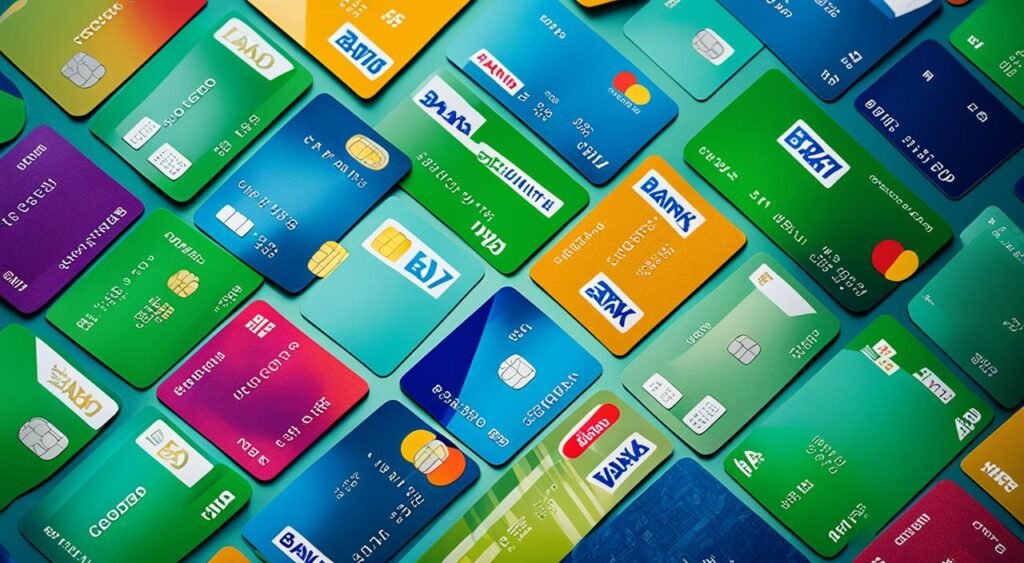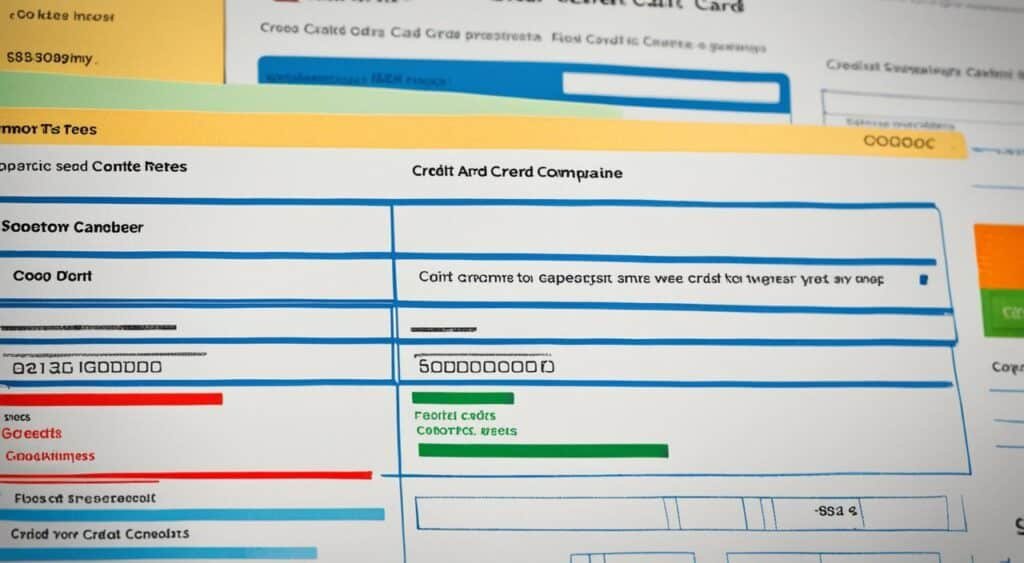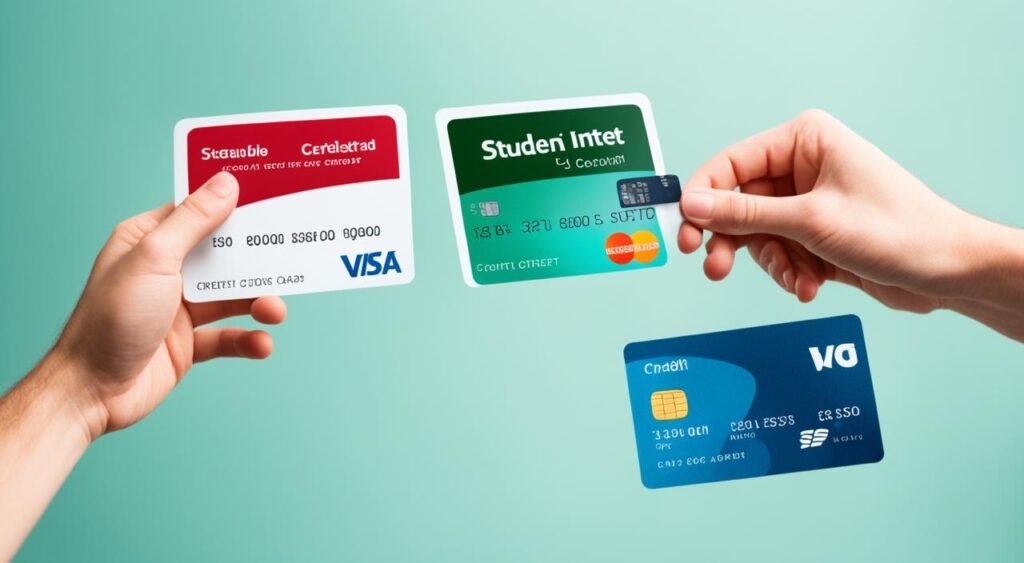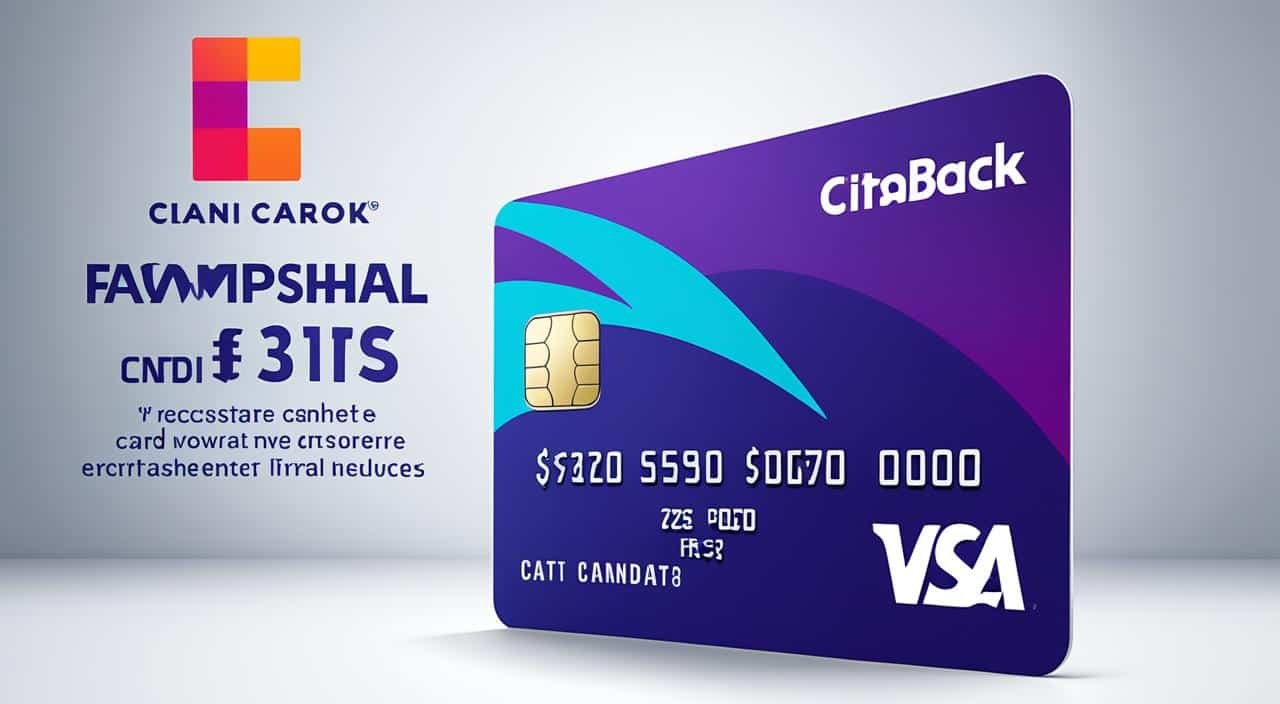What Are The Best Credit Cards For Students?
Building a strong credit history is key for students. The right credit card helps you do this. It also lets you earn cash back or rewards. Plus, you can avoid big annual fees. Or escape balance transfer charges. If you want to build credit or gain from intro APR offers, you’re in luck. Many student credit cards are designed for these goals.
Key Takeaways
- Student credit cards can help build credit history and establish good financial habits early on.
- Look for cards with no or low annual fees, cash back or rewards programs, and favorable interest rates.
- Consider factors like credit reporting, rewards, and fees when comparing student credit card options.
- Using your first credit card responsibly is crucial for maintaining good credit health.
- Alternatives like secured cards and becoming an authorized user can also help build credit as a student.
Why Build Credit as a Student
It’s key to start building your credit score early as a student. This can lead to big benefits later. A good credit history makes getting loans and rentals easier in the future. It also boosts your job prospects and helps you learn good financial habits.
Easier Access to Loans and Rentals
With a solid credit report, getting a loan is simpler. This includes student loans to car loans. When you look to rent, landlords often check your credit score. Good credit makes finding a place after school easier.
Better Job Prospects
Today, many jobs look at your credit report when hiring. This is more common for jobs handling money or sensitive data. Having good credit can help you get the job you want and move up in your career.
Establish Good Financial Habits Early
Starting early with good credit habits can help you in the long run. This means paying on time, keeping credit utilization low, and checking your credit report regularly. These habits will be very useful in life.
Eligibility for Student Credit Cards

Getting a student credit card means you must meet certain criteria. This includes age limits, how much money you make, and your credit history.
Age Restrictions
To get a student credit card, many places say you have to be 18. But for some, you need to be 21. This makes sure you can legally agree to use the card.
Income Requirements
Most companies that offer student credit cards don’t need you to make a lot of money. They accept earnings from part-time jobs, work-study, or help from your family. They want to help students start building their credit scores.
Credit History Considerations
Even though these are for students just starting out, sometimes your credit history is still looked at. They check if you’ve had other credit cards, paid your bills on time, and how much credit you’ve used. These can affect if you get approved and your credit limit.
Learning about these requirements can help students apply more successfully. This way, they can start building their credit and handling their finances wisely.
Credit Cards

Student credit cards are great for building credit history. You should look for certain things in them.
Build Credit History
Having a good credit history is key for students. It helps with getting loans, finding a place to rent, and getting good jobs later. These cards share your payment habits with big credit agencies. This helps you improve your credit as time goes on.
Rewards and Cash Back
Some student credit cards give rewards and cash back. They make it fun to use your card wisely. Find cards that give extra rewards for things like eating out, buying food, and having fun. This way, you save more money.
No or Low Annual Fees
Thinking about annual fees is crucial when picking a card. Many cards don’t charge a yearly fee, or they charge very little. This is good news for students watching their budget. It means you can use a card without spending a lot extra.
Top Student Credit Card Options
Several top-rated credit cards stand out for students wanting to build credit. These offerings have features to help young adults build a strong credit score and get rewards. Let’s see some of the best student credit card choices:
Discover it® Student Cash Back
The Discover it® Student Cash Back card is great for those who want cash back. It gives 5% cash back in growing categories each quarter (after you activate). You’ll also earn 1% cash back on all other buys.
Discover matches all your cash back after the first year. This can double your rewards. With no yearly fee and a fair APR, it’s a top pick for students.
Capital One SavorOne Student Cash Rewards Credit Card
The Capital One SavorOne Student Cash Rewards Credit Card is perfect for students who love dining and fun. It offers 3% cash back on dining and entertainment, 2% at grocery stores, and 1% on other buys.
With no annual fee and a 0% intro APR for 15 months, it’s a solid choice for getting rewards on daily spends.
Bank of America® Travel Rewards Credit Card for Students
If you prefer travel rewards, the Bank of America® Travel Rewards Credit Card for Students is a smart pick. It gives 1.5 points for every dollar spent all over, with no travel dates blocked. Plus, there’s a 0% intro APR for the first year.
This card is a good option for building credit and earning points on purchases.
Alternatives for Building Credit
For students who can’t get a traditional student credit card, there are other ways to build credit. They can start a solid financial base with these alternatives.
Secured Credit Cards
Secured credit cards are a top choice for those with little or no credit history. A security deposit is needed, setting the credit limit. By using the card wisely and paying on time, students can build credit. Eventually, they can move to unsecured credit cards.
Become an Authorized User
Students can also build credit by joining a parent or guardian’s credit card as an authorized user. This lets them use the good credit of the account holder to improve their own credit score. It’s important for the main cardholder to keep up their good credit building habits.
Rent Reporting Services
There are services that allow students to build credit by reporting their on-time rent payments to credit bureaus. For those without traditional credit card or loan access, this is a great alternative credit building strategy.
Factors to Consider When Comparing Cards

When looking at student credit card options, it’s key to think about several factors. Credit reporting, annual fees, and rewards and benefits stand out. These are crucial aspects to compare.
Credit Reporting
A student credit card’s main goal is to boost your credit history. It is vital that your payment history gets reported to major credit bureaus. This helps build and enhance your credit score as you go along.
Annual Fees
Many student credit cards won’t cost you yearly or have low fees. This makes them easier on the wallet for students. Do check different card fees to spot the best budget-friendly pick.
Rewards and Benefits
Student credit cards often come with cool rewards and benefits. These are there to encourage using credit wisely. Look for cash back, travel rewards, or fit-the-bill perks. Assessing these bonuses helps you get the most out of your card.
By weighing these factors, you can make an informed choice on student credit cards. This helps you find one that meets your financial needs. It also aids in building your credit history the right way.
Managing Your First Credit Card

Learning to use your first credit card wisely is key to good credit. You can start building a strong future by practicing some important steps. These will help you manage your credit card well and stay financially healthy.
Make Payments on Time
Making on-time payments is crucial for your credit score. A big part of your credit score comes from how timely your payments are. Always pay at least the minimum by the due date. Use automatic payments or set up reminders to avoid late payments.
Keep Credit Utilization Low
It’s also vital to keep your credit utilization low. This is how much of your total credit you’re using. Try to use less than 30% to show you use credit responsibly and keep your credit score high.
Monitor Your Credit Report
Checking your credit report often helps you spot and fix problems early. Make sure to review your credit report regularly to keep its info correct. If you see any mistakes or signs of fraud, act fast to correct them.
Importance of Responsible Credit Use
Managing credit cards well is key for good credit health. It helps you build a strong credit history and score. These are important for future credit card choices, loans, and work opportunities.
Making on-time payments shows you’re reliable. It proves you handle your credit card well. Also, try to keep your spending under 30% of your credit limit. This can boost your credit score and health.
It’s also smart to check your credit report often. This helps catch and fix any credit problems early. By being careful and wise with credit, you’re setting up a strong financial future.
Tips for Building and Maintaining Good Credit
For students, building and keeping a good credit score is key for their future finances. Here’s how to do it:
Understand Credit Scoring Models
Know about credit scoring models like FICO and VantageScore. They look at your payment history, how much credit you use, how long you’ve had credit, and if you apply for new credit. This knowledge will help you make choices that boost your credit health.
Avoid Missed Payments
Paying on time is super important for your credit score. Late or missed payments hurt your credit report. Use automatic payments or set up reminders to never miss a deadline.
Limit Credit Applications
Every time you apply for credit, your credit score might go down a bit. To keep your credit health in check, only apply for new credit when you really need it. Focus on making your credit history strong instead of getting a lot of new credit.
By knowing about credit scoring models, paying on time, and being careful with new credit, you can keep your credit good. This is important for students and anyone who wants a strong financial future.
Also read: What Should I Do If My Credit Card Application Is Denied?
Conclusion
It’s important for students to build their credit. This helps with many things long-term, like getting loans or renting a place. It also makes job hunting easier. Starting early with a student credit card can help you build a good credit history and score. This sets you up for success in the future.
Choosing the right student credit card matters. You might pick one with cash back, travel perks, or no annual fee. The main thing is to be smart with your card. Pay your bills on time. This helps you build credit. It also teaches you to be responsible with money, a key skill for your future.
Using a student credit card wisely is a step towards a strong financial future. By making smart choices and handling your credit well, you can enjoy the benefits of good credit. This includes easier access to loans, better job options, and more.
FAQs
Q: What are the benefits of applying for a Wells Fargo student credit card?
A: Wells Fargo student credit cards offer perks such as cash back rewards, credit building opportunities, and convenient online account management.
Q: How can I compare and apply for a business credit card?
A: To compare and apply for a business credit card, you can visit the websites of different card issuers, review card benefits, and submit an online application.
Q: What is a balance transfer fee on a credit card?
A: A balance transfer fee is a charge imposed by the card issuer when you transfer a balance from one credit card to another. It is typically a percentage of the amount transferred.
Q: What is an intro APR and how does it impact my credit card balance?
A: An intro APR is an introductory annual percentage rate offered by credit card issuers for a limited period. It can help you save on interest charges for purchases and balance transfers during the promotional period.
Q: How do foreign transaction fees affect credit card purchases while traveling?
A: Foreign transaction fees are charges applied by credit card issuers for transactions made in foreign currencies or outside of your home country. They can increase the cost of your purchases abroad.
Q: What are cash back rewards and how can I earn them with a student credit card?
A: Cash back rewards are incentives offered by credit card issuers for making purchases with the card. Students can earn cash back on eligible purchases and redeem them for statement credits or other rewards.
Q: How can I find the best credit card that suits my needs and preferences?
A: To find the best credit card, consider factors such as your credit score, spending habits, rewards preferences, and card benefits. You can compare credit card offers online and apply for the one that fits your criteria.
Source Links
- https://www.bankofamerica.com/credit-cards/student-credit-cards/
- https://www.nerdwallet.com/best/credit-cards/college-student
- https://www.forbes.com/advisor/credit-cards/best/student/
